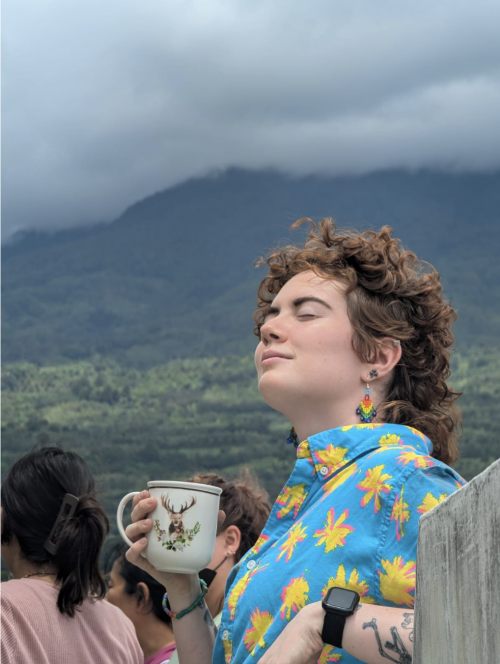Mayan Language Institute: Keara Sparks Student Profile
Interview by Emma Kainz
Keara Sparks is a second-year Ph.D. student in Linguistics at Tulane University. Originally from rural Pennsylvania, they moved to New Orleans in 2016 to attend Tulane for their undergraduate years before pursuing graduate studies later on. Keara intends to work with language revitalization projects, particularly in Ireland. They are currently a research assistant for the Tunica-Biloxi tribe, and began studying Kaqchikel with Tulane during the first year of their Ph.D. program. Now, through the Tulane Stone Center, they are continuing their studies of the Kaqchikel language and culture in Guatemala. They consider this program to be an excellent opportunity to learn a language with the community working towards the revitalization. The Kaqchikel program is a perfect example of what language revitalization programs can do, and they look forward to being a part of it. In their spare time, Keara enjoy video and board games, horror movies, reading science fiction/horror classics, DnD, studying languages, and working with a local animal shelter.
Why did you decide to participate in the Mayan Language Institute?
After taking my first Beginner Kaqchikel class in the fall of ’23, the two teachers (Judith Maxwell and Ixnal) let us know about this program that would be taking place over the summer. Pretty much immediately, I knew I wanted to try and make it happen. I had never been to any Latin American country before, and I couldn’t believe I’d have the chance to study a revitalizing language within its own area of practice. Beyond the fact that it would be an excellent first-hand experience with language revitalization, it just sounded like it would be so much fun.
What have you learned from this experience that was unexpected?
My Spanish and Kaqchikel improved, which I expected. But I absolutely fell head over heels for the Guatemalan food we had, so I had to take a few recipes home with me.
Do you think the Mayan Language Institute will have an impact on your future? How?
First of all, I am so excited to continue my Kaqchikel learning journey. Second, the teachers and Kaqchikel community members that we got to meet and work with were amazing. They were all so incredibly passionate for their project, and always welcoming and patient with everything. I want to maintain my connections that I formed, and I would also love to assist in some way in the future.
Share with us an anecdote from these past weeks/days. It can be something that condensed the learning experience, or a memorable experience you had with your peers, professors, or the community.
Pretty much every single day was filled with memories, so it really is difficult to pick just one. We got to speak to a Kaqchikel poet, weave mats, visited Panajachel, Hobbitenango, a cat café, and so on. But I do think that one of my favorite parts overall was the moments in class that made me laugh so hard, my face would hurt and my eyes would water. One specific example of this was when the whole class was learning/reviewing the Kaqchikel nouns for various animals. The different animal impressions students and teachers alike gave of the different animals, and the level of commitment people would give to their examples, was absolutely hilarious (and also helpful in making the Kaqchikel terms memorable). I think it’s also the perfect example of what the whole trip was. We learned while also laughing and enjoying the process.
The Mayan Language Institute is a 6-week program to train students in either Kaqchikel or K’iche’ Maya, two of the most widely-spoken Mayan languages in Iximulew (Guatemala) today. The program is sponsored by the Stone Center for Latin American Studies at Tulane University and the Center for Latin American, Caribbean, and Latinx Studies at Vanderbilt University. Thanks to the collaboration between U.S. American faculty and Maya teachers, participants can study at the beginning, intermediate, or advanced levels of either language. The program’s highly individualized classes combine language immersion activities, lectures, one-on-one conversations, guest speakers and cultural excursions. If you are interested in learning more about the Mayan Language Institute or other Summer Programs click here.

